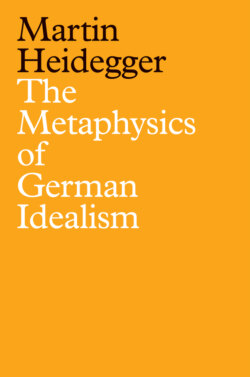Читать книгу The Metaphysics of German Idealism - Martin Heidegger - Страница 13
§ 5 Brief Excursus on a Further Misgiving (the Historiographic – the Current – That Which Has Been)
ОглавлениеIn reflecting on what is treated in the Freedom Treatise, we find our way into essential relations to that which “is”; or, better put, we experience that and how we “are” in such relations. We experience and consider that which “is.” Fine; but what merits the distinctive designation: it “is”? What is called “being”?
This chair over there – “is.” Is that which “is,” in the manner of the chair? With this, do we have a yardstick for measuring what “is”? All sorts of things “are” in such a way; whence the measure of being? Is there a measure here at all? The relation to that which “is,” and even the essential relations: difficult to experience. Wherein lies the ground of the “difficulty”? (the abandonment of beings by being – the forgetting of being by the human)
So, not only, nor first of all, to learn about something or other; not some sort of “instruction” about learned matters. But surely still less a snatching at what is “practically” useful and “germane to life.”
If, however, a reflection on essential relations in which “we” stand – we, here and now – why then a treatise from a bygone age?
Historicism! The making-present of the past – and explaining on the basis of what lies further back in the past {Vor-vergangenen}; flight into a holding onto the past; counting on ways out of the present; “restoration” – “eschatology”; (the essence of historicism is not mere “relativizing”);
10
Or, alternatively,
Currentism – as its flipside; to settle the past on the basis of its value for the present, and the “future” as the extended “present” (its plans); – “untimeliness” as the fiercest dependence on time; constantly staring at it. Even the relation to the “future” changes nothing if the latter is but the forward extension of the present – indeed of a present in its congealment. (See, for example, Pinder, Essential Features of German Art).7 The calculative game between “past” {“Herkunft”} and “future” {“Zukunft”} as enslavement to an uncomprehended present; whereby relativism is apparently supposed to be abolished.
Moreover, {see} Schelling himself (see above, p. 3) in the final remark of the treatise.
Nevertheless: not a historiographic and up-to-date explanation of something past, but rather a historical confrontation with what has been {Gewesenem} and thus with what first essences {Wesendem}.
The aforementioned misgiving subsides; but it can also persist {bestehen} – but not for those who under-“stand” {ver-“stehen”} otherwise.
1 1. {TN: i.e., the advertisement about the lecture course made available to students.}
2 2. {TN: For bibliographic information, see § 3 and the relevant note in that section, below.}
3 3. Friedrich Wilhelm Joseph von Schellings sämmtliche Werke, ed. Karl Friedrich August Schelling (Stuttgart and Augsburg: J. G. Cotta, 1856–1861).
4 4. F. W. J. Schelling, Das Wesen der menschlichen Freiheit. (Philosophische Untersuchungen über das Wesen der menschlichen Freiheit und die damit zusammenhängenden Gegenstände, 1809), newly edited with an introduction, index of names, and index of subjects by Christian Herrmann (Philosophische Bibliothek, vol. 197) (Leipzig: Felix Meiner, 1925). {TN: Translations of Schelling’s treatise come, with occasional modifications, from Jeff Love and Johannes Schmidt’s rendering in F. W. J. Schelling, Philosophical Investigations into the Essence of Human Freedom (Albany: SUNY Press, 2006). This edition also includes the pagination of Sämtliche Werke.}
5 5. {TN: Heidegger writes both Centrum (without italics) and Zentrum. We distinguish them in the translation by italicizing the former. Mitte appears as ‘center.’}
6 6. G. W. F. Hegel, Vorlesungen über die Geschichte der Philosophie, 3 vols. (Stuttgart 1928), p. 682 [XV, 682], Sämtliche Werke, ed. Hermann Glockner, vol. 19. [In what follows, all Hegel citations and references are based on this edition.]
7 7. Wilhelm Pinder, Wesenszüge deutscher Kunst (Leipzig: Seemann, 1940).
